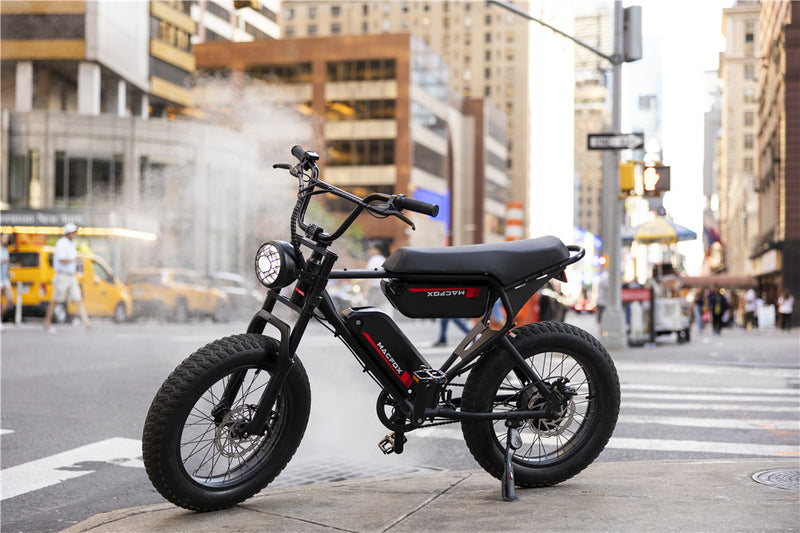Have you been eyeing that fancy new ebike and taking it out for some test rides? Surely it feels perfect?
However, when you examine the price tag, you may be shocked to discover it's more expensive than anticipated. Let's investigate why these e-bikes can be so pricey.
The Pricey Powerhouse: Batteries
The battery is the heart of your e-bike.
Modern e-bikes typically employ lithium-ion batteries, which may be costly but serve a useful purpose.
Lithium-ion batteries are known for their high energy density, meaning they deliver plenty of power while being light in weight.
These newer lithium-ion batteries also last longer and charge faster than older lead-acid ones.
All these benefits, however, come at a price.
An example would be a 500Wh battery, which provides 30-50 miles per charge and typically costs $500-$700.
If you require more range with a larger battery pack (750Wh or above), the price could skyrocket beyond $1,000.

Motors: Where the Magic Happens
Your electric bike's motor provides extra power when needed.
Motors vary considerably in price depending on their type.
Hub motors are generally a cheaper, simpler alternative, typically costing between $200 and $500. They are often used in affordable electric bikes.
However, mid-drive motors may be worth considering for an easier and more powerful ride.
Motors like these tend to be more complex and costlier than standard ones—typically between $500 and over $1,500.
Bosch, Shimano, and Yamaha are known for creating reliable yet high-performance motors.
Why Frames Aren’t Just Frames
While frames may appear to be the anchoring device for everything to fit together, much of their cost comes from their material composition and design.
Most electric bike frames are constructed from aluminum alloy, which is both lightweight and strong—two qualities essential for creating durable yet responsive rides.
Carbon fiber might be your ideal material for superior-quality frames. Not only is carbon lighter and stronger than aluminum, but production costs are also much more prohibitive.
Integrating a motor and battery into a bike frame without altering its look or structural integrity requires expert engineering work that costs significant money to design.
Carbon fiber frames could add $1,000-$2,000 to the overall cost of an electric bike.
Read more: Why Don't E-Bike Users Just Buy Motorcycles?
Tech That Makes Your Ride Smarter
E-bikes are becoming smarter over time.
Many modern e-bikes feature GPS tracking, smartphone connectivity, and performance monitoring capabilities.
These features allow you to track your speed and distance and navigate around town more effectively.
However, adding all this technology requires complex software and hardware development work, increasing costs significantly.
Intelligent features are especially common on high-end models, providing an exclusive riding experience.

The Backstory: Research, Development, and Compliance
The price of an e-bike doesn't just reflect its components.
At the core of it all is the hard work done behind the scenes by companies to ensure their e-bikes are cutting-edge, safe, and reliable. Companies often invest heavily in research and development efforts to stay at the cutting edge.
Testing and refining require many hours of effort, which ultimately adds up to an increased cost.
Additionally, manufacturers must ensure that their e-bike products adhere to safety and environmental regulations.
U.S. state regulations can differ regarding electric bikes, so manufacturers must ensure that their bikes comply with all state requirements and meet each standard in every state they sell them in.
Compliance with these regulations often necessitates additional testing and certification processes, increasing costs.
Wrapping It Up
E-bikes can be expensive because of their intricate engineering design, extensive material use, not to mention all of the thought that has gone into their creation.
Although the initial investment may seem prohibitive, remember that you are investing in an eco-friendly solution with long-term value.
Tax breaks and incentives could reduce the overall costs, making the price more manageable than anticipated.
If you've been considering purchasing an electric bicycle, do feel free of cost.
Learn what you are paying for and take advantage of programs that might assist.
Soon, you'll be experiencing all of the advantages your new electric bike offers, easily zipping through town.
FAQs
Why are e-bikes more expensive than regular bikes?
E-bikes have advanced components like lithium-ion batteries, powerful motors, and high-quality frames, which increase their cost.
Can e-bike prices be reduced with government incentives?
Yes, some states offer tax incentives and rebates that can help lower the cost of purchasing an e-bike.
What factors should I consider when buying an e-bike?
Consider battery range, motor type, frame material, and any available smart technology or government incentives.

















